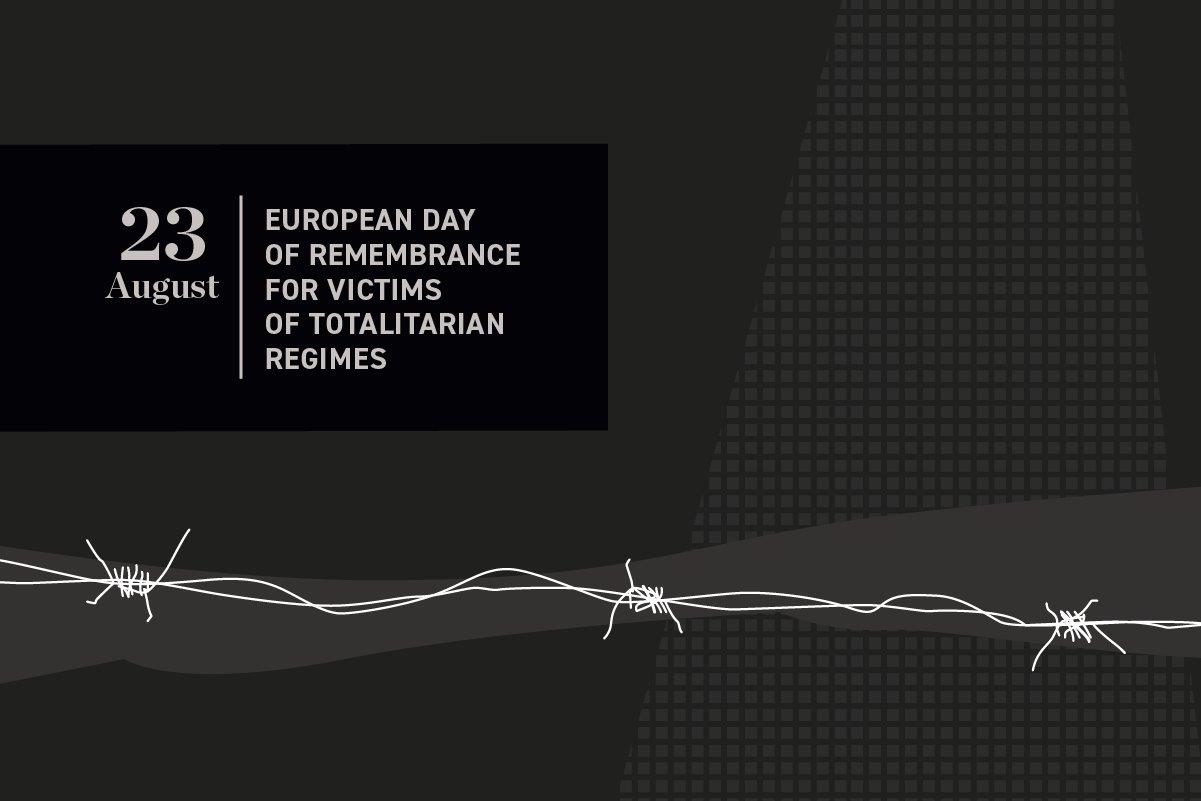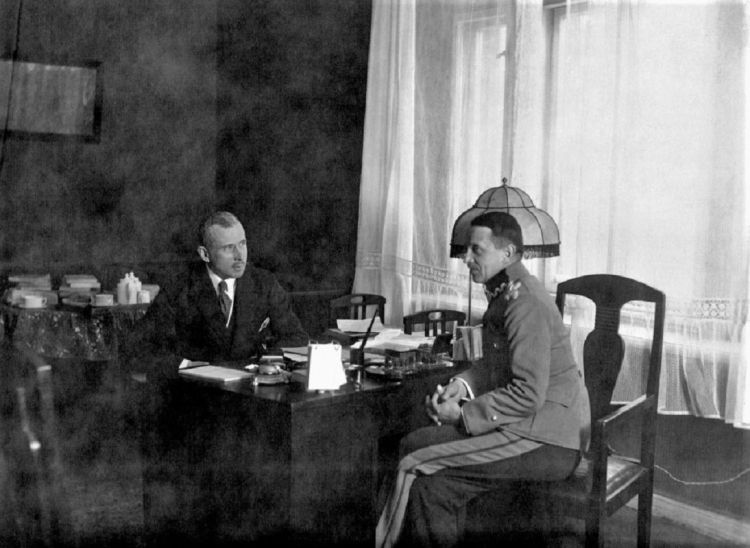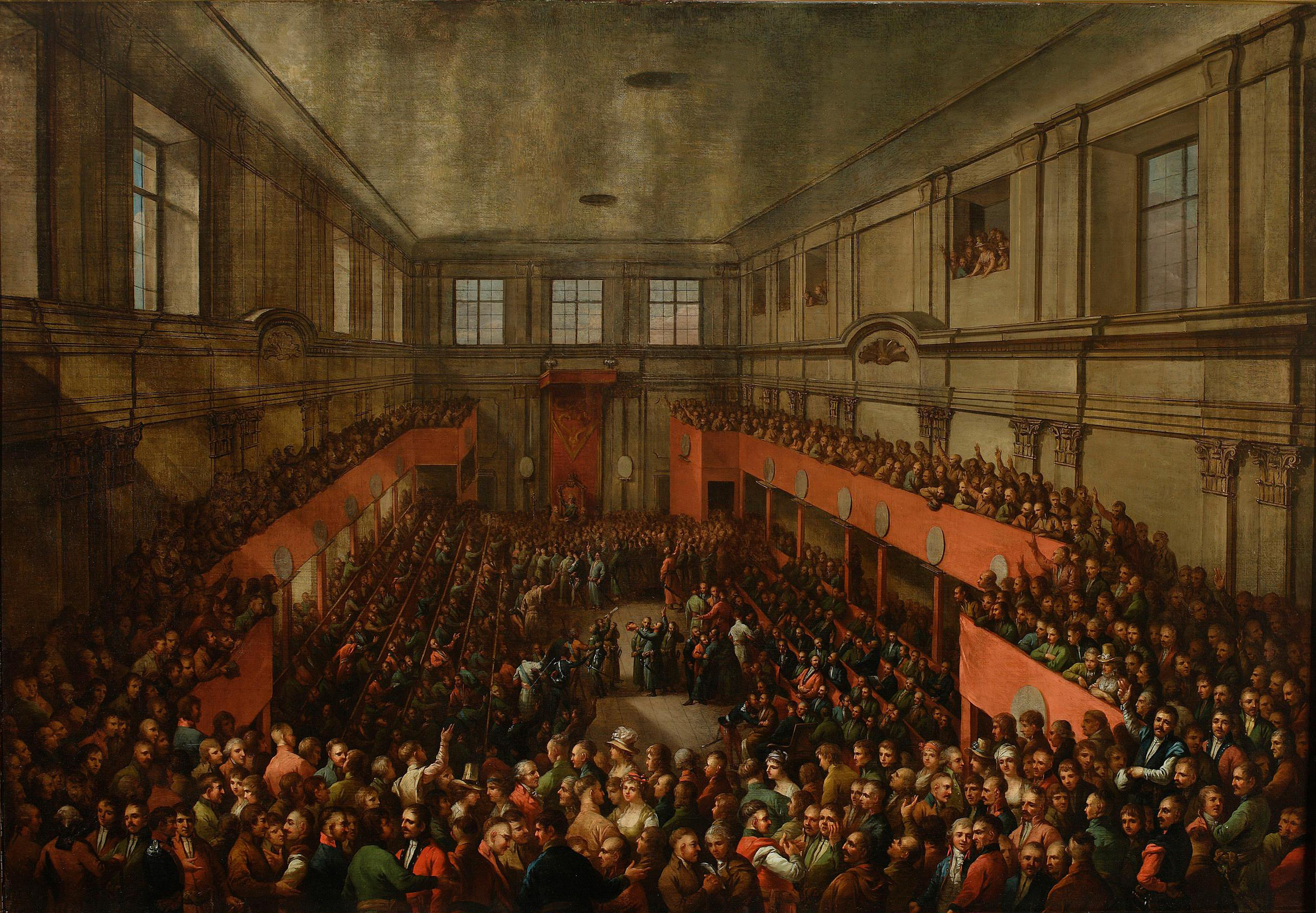Commemorating the victims of the greatest crimes of the 20th century and warning against the tragic consequences of totalitarian regimes – this is the main goal of the upcoming European Day of Remembrance for the Victims of Totalitarian Regimes. Natalia Pochroń from MHP speaks with the director of the European Network Remembrance and Solidarity to discover how this commemoration was established and what it tells us about the European view of 20th century history.
Polish History Museum: On 23 August, we celebrate the European Day of Remembrance for the Victims of Totalitarian Regimes. Why on this particular day? Why was this date chosen?
Rafał Rogulski: On 23 August 1939, the Soviet Union and the Third Reich signed an agreement – formally on non-aggression, but in fact, thanks to a secret protocol attached to it, on the division of Europe into two spheres of influence under these totalitarian regimes. In Poland, we know it as the Molotov-Ribbentrop Pact, from the names of the foreign ministers of the Third Reich and the USSR who signed the document. In many European countries, however, it is known as the Hitler-Stalin pact, and this is actually a more appropriate title: it more bluntly illustrates the role of both totalitarian regimes – Nazi and communist – in starting the Second World War.
MHP: Why was it so important to establish that connection?
Rafał Rogulski: For a long time, the communists carefully concealed their cooperation with the Nazis in early days of the war – especially in that part of Europe which found itself under the influence of the Soviet Union after the end of the war. In turn, on the other side of the iron curtain, this fact was not taken seriously and its importance diminished. And it was wrong. The pact of 23 August 1939 was crucial to everything that happened in the following years on the European continent. It should be talked about out loud and emphasized. The European Parliament decided to take this direction in 2008 by establishing the European Day of Remembrance for the Victims of Totalitarian Regimes. It is a pity that in most Western countries this date is almost unnoticed and the historical act behind it is often under represented.

Read more: enrs.eu/august23
MHP: In 2008, almost twenty years had passed since the collapse of the USSR. Why did we have to wait so long for this commemoration?
Rafał Rogulski: The European Day of Remembrance for Victims of Totalitarian Regimes was officially established in 2008, but various activities commemorating the victims of totalitarian regimes were undertaken much earlier. Already in 1989, on the fiftieth anniversary of the signing of the Molotov-Ribbentrop Pact’s secret protocol, the so-called Baltic Way was established. This was a mass protest of the residents of three countries: Lithuania, Latvia and Estonia (then formally part of the Soviet Union as Lithuanian, Latvian and Estonian SSR) against the then political situation in countries dominated by the USSR. Nearly 2 million people created a living chain more than 600 kilometers long, condemning the effects of this disastrous pact and calling for freedom and independence – amazing! It must be remembered that this was right after the elections in Poland (4 June), but before the formation of Tadeusz Mazowiecki’s government and before the fall of the Berlin Wall, and it happened in the USSR. Also from an organizational point of view, it was an unprecedented undertaking – after all, there were no mobile phones nor the Internet.
Other similar activities took place as well, although not on such a large scale. In the countries of Central and Eastern Europe, this idea had been circulating for a long time. They had experienced the severe effects of totalitarian regimes, so the joint commemoration of their victims was and is something completely natural and understandable for them. The situation is different with the countries of Western Europe, where the significance of the pact is underestimated to this day. British historian Roger Moorhouse writes about it in an interesting way on the online platform Wszystko Co Najważniejsze [eng: Everything That Matters].
MHP: They don’t see a need for this commemoration?
Rafał Rogulski: They certainly feel the need to commemorate the victims, but for many people the choice of 23 August and the anniversary of the Molotov-Ribbentrop Pact is debatable. This is largely due to their different view of the 20th century. Western European countries do not have a common experience of both totalitarian regimes. Most of them did not suffer in any way from communism – a criminal ideology that was de facto on the side of the victors of the Second World War. What is more, in some countries in the post-war period various communist circles were quite active and they still function to a limited extent today. A lack of experience with totalitarianism and the victims of communist violence, and above all the Moscow-backed narrative about the non-existence of a secret protocol and denial of cooperation with Nazi Germany, leaves many vulnerable to disinformation.

MHP: However, Germany experienced both totalitarian regimes, and yet it does not participate in the European Day of Remembrance for the Victims of Totalitarian Regimes. Why?
Rafał Rogulski: In the case of Germany, the situation is slightly different. Indeed, they experienced both totalitarianisms – first as the Nazi Third Reich, and then, in the case of the GDR, communism. The choice of 23 August to commemorate the victims of totalitarianism, however, arouses controversy among them for another reason. Building a sense of responsibility for the Holocaust is at the heart of the German culture of remembrance. For this reason, many German historians are against treating the anniversary of the Molotov-Ribbentrop Pact as a common symbol of remembrance of the victims of Nazism and communism. They believe that it indirectly blames the Soviets for the extermination of the Jewish people which the Germans planned in detail during the Wannsee conference, among others, and then implemented.
Additionally, there are arguments about the alleged marginalization of the victims of the Holocaust and the crime itself, strongly supported by Jewish circles, and not only in Germany. All this makes it hard for many German intellectuals to accept bringing Nazism and communism together until today. This is primarily the result of their conservative attitude towards commemorating this anniversary.
MHP: You admitted that in countries that fell victim to both totalitarian regimes, it is obvious that these regimes should not be forgotten, so it is not surprising that they are taking part in the European Day of Remembrance for the Victims of Totalitarian Regimes. The absence of countries responsible for these totalitarianisms seems worrying. Can it bring about the desired results without them?
Rafał Rogulski: It’s not that everyone in Germany rejects this day completely. Despite the conservatism and skepticism of some circles, there are also people and institutions in this country who understand its importance and share our narrative. Thanks to their activity, and, to some extent, cooperation with us, the awareness of the Germans about the dire consequences of the Molotov-Ribbentrop Pact is gradually growing. It is not easy, but it must be remembered that historical policy is a complex and long-term process, and the educational backlog in this aspect is not small. [That is the case] not only in Germany, but throughout the EU. However, this is nothing compared to Russia. Years of falsifying history or disinformation processes have wreaked havoc on the minds of its citizens. At the end of the nineties, at one of the German universities, a Moscow woman, freshly graduated from high school, tried to convince me publicly that in Katyn, the Polish officers were murdered by the Germans. This reveals a great deal about the level of historical instruction in Russia at that time. And when you hear what its president has been saying in recent years, it is easy to imagine how this issue looks today.

MHP: In view of the different experiences of totalitarianism and the conservative approach of Western Europe to our Central European memory, can we even talk about something like common politics or historical memory?
Rafał Rogulski: This issue has been a subject of debate for many years. The question is whether we really need this common European memory at all. I think that what is most needed today is, above all, an international dialogue on history and memory. I am, of course, critical of any attempts to unify the story or tell it according to any imposed pattern. In the history of the European continent, there are many facts or events that unite us all, but there are also many that divide us and that we interpret, remember and commemorate in a slightly different way. One such element is the experience of totalitarianism in the 20th century. We will not change this. However, we can – and should – talk about it, share our own experiences, and try to understand each other. Only in this way can this day of remembrance of the victims of totalitarianism and other important dates in the history of the peoples of Europe have a chance to come together and give us the feeling of a more inclusive community.
MHP: What is the main goal of this day?
Rafał Rogulski: First of all, commemorating the millions of victims of totalitarianism, commemorating those who died or suffered due to persecution or the loss of loved ones. It is not just about remembering history. Contrary to appearances, this is an extremely timely topic. In our own way, we are almost all victims of totalitarianism – almost every family in our part of Europe, but also many families in the West, bear the experience of losing a loved one due to Nazism or communism. We are celebrating the European Day of Remembrance for the Victims of Totalitarian Regimes in order to remember them, but also not to forget why it happened.
MHP: One of the goals of the day was also to embed democracy and strengthen peace and stability in Europe. Despite this, the eastern part of the continent is plunged into war again.
Rafał Rogulski: Unfortunately, it is but it does not mean that the celebrations of this day are pointless or bring no results. Such exceptional circumstances as the ongoing war in Ukraine, and especially the way in which it is justified, make us even more convinced that the best vaccine against disinformation is knowledge and common sense. The ambitious goal that the European Parliament set for us in establishing this day, and the parliaments of the countries that have approved it, are more relevant than ever. Of course, by producing commemorative pins, films or carrying out educational projects, we will not prevent every conflict, but we have a chance to increase knowledge about history and inspire reflection not only over urns filled with the ashes of the fallen, but also over the ballot boxes. Strengthening peace and stabilization is a permanent process. Freedom is not given to us forever – it is a value that must be constantly worked on. We, Poles, know something about it.

MHP: Poland was one of the few countries that fell victim to both totalitarianisms – Nazism and communism. It is a special experience, but also a responsibility. How is Poland fulfilling it?
Rafał Rogulski: In many different ways. On the one hand, there are activities that aim at commemorating the victims of totalitarianism – by caring for their graves, discovering previously unknown burial places, searching for and identifying victims, carrying out national and regional anniversary celebrations, and publicly recognizing the families of the victims. On the other hand, these are all educational campaigns aimed at promoting knowledge and increasing society’s awareness of the tragic consequences of totalitarianism – both inside the country and abroad. The most important element of the Polish state’s activity is the institutionalization of memory – the creation of local and national institutions disseminating knowledge about the history of the victims of totalitarianism, cooperating with foreign entities, and activity on an international level. I think that Poland is doing a lot in this matter, as exemplified by the aforementioned celebration of the European Day of Remembrance for the Victims of Totalitarian Regimes.
MHP: What does it look like?
Rafał Rogulski: As the European Network Remembrance and Solidarity, we try to commemorate this day in several ways. We screen short thirty or forty second long films to present the profiles of specific victims of totalitarianism. In recent years, they were, inter alia, the Czech oppositionist Milada Horákova, the Estonian writer and translator Jaan Kross, and the Polish Home Army soldier and journalist Kazimierz Moczarski. This year, [we are presenting other histories], including, among others, Doina Cornea and Władysław Bartoszewski. By distributing these films both in Poland and abroad, we want to show the universal mechanism of totalitarianism, and at the same time the different forms it took in individual countries of the former Eastern Bloc.
In addition to films, we also send symbolic pins to members of the European parliament with a note explaining why the memory of 23 August 1939 is important to all Europeans. This year, we also started a pilot project with a poster campaign in Warsaw presenting profiles of the victims of totalitarianism to show their faces, and show that they were people like us. All these activities, apart from their educational value, are intended to remind us of the cruel consequences of totalitarianism. Today our neighbors from Ukraine are experiencing them the hard way.

MHP: Despite many efforts to consolidate peace on the continent, a certain part of Europe is again plunged into war. Additionally, the aggressor is the state that was responsible for one of the most criminal ideologies of the 20th century. Is it truly possible to overcome totalitarianism completely?
Rafał Rogulski: The history of the world shows that, unfortunately, it has not been possible so far. Although the two greatest totalitarianism movements of the 20th century were overthrown, various forms of slavery have survived to this day – for example, Russia, China, North Korea and a number of smaller states struggling with totalitarian rule. Is it possible to eliminate them completely? I do not know. But we have to keep trying, no matter how unrealistic the goal may seem. However, it is worth remembering one thing – it is impossible to effectively fight totalitarianism from the outside, against the will of the citizens of the country in which it is occurring. Above all, it is they who must want it and – importantly – be ready to suffer in this struggle as this is what is very often required. This was the case in Poland in the 20th century and in many other countries of Central and Eastern Europe. We, as a nation, have already trod this path, so we can, and even should, support others [along their way] – which, as we know, we are doing in various ways.
Whatch YouTube videos of the European Network Remembrance and Solidarity
Interviewer: Natalia Pochroń
Translation: Alicja Rose & Jessica Sirotin





